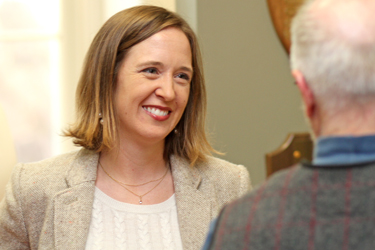 Working on Capital Hill and for political campaigns taught Adriel Trott a lot about community.
Working on Capital Hill and for political campaigns taught Adriel Trott a lot about community.
Studying philosophy has taught her even more.
“Reading the Ancient Greeks changed my assumptions about community,” the BKT Assistant Professor of Philosophy said Monday during a reception in Center Hall celebrating the publication of her new book, Aristotle on the Nature of Community.
“I had thought that we are first individuals—with all the rights and responsibilities of individuals—and capable of choosing whether to enter community, and therefore capable of leaving community. So I thought of community as a tool that serves the individual, who can be free of the community when it has done its task.
“When I read Plato and Aristotle, I saw a sense of community where individuals become who they are from within a community, and that they thrive as part of a community.”
In Aristotle on the Nature of Community, published by Cambridge University Press in October, Trott argues that Aristotle’s view is relevant for contemporary efforts to improve and encourage genuine democratic practices.
 And she’s been practicing what Aristotle preached, participating as a note-taker at the recent Community Conversation in Montgomery County, a forum brought together by the Montgomery County Prescription Drug Task Force, the Montgomery County Probation Office, the Montgomery County Youth Service Bureau, and the Wabash College Rhetoric Department.
And she’s been practicing what Aristotle preached, participating as a note-taker at the recent Community Conversation in Montgomery County, a forum brought together by the Montgomery County Prescription Drug Task Force, the Montgomery County Probation Office, the Montgomery County Youth Service Bureau, and the Wabash College Rhetoric Department.
Trott says that “Wabash is a place that takes community seriously.
“Someone asked me at the book party what Aristotle would say about Wabash, and I said, ‘Aristotle would say we are forming community in this work we do together, talking to one another about what matters to us.’”